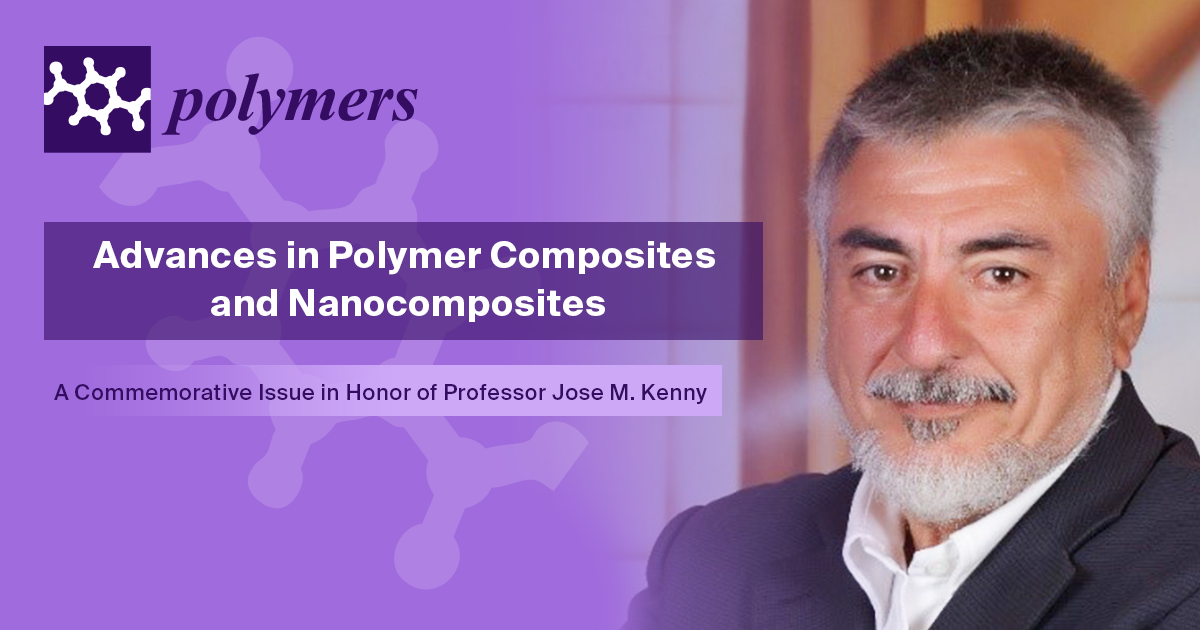- 4.9Impact Factor
- 9.7CiteScore
- 14 daysTime to First Decision
A Commemorative Issue in Honor of Professor Jose M. Kenny: Advances in Polymer Composites and Nanocomposites
This special issue belongs to the section “Innovation of Polymer Science and Technology“.
Special Issue Information
Dear Colleagues,
This Special Issue “Advances in Polymer composites and Nanocomposites” was born as a commemorative Special Issue in honor of Professor José M. Kenny and his recent retirement from the academic world, being based on subjects relevant to his scientific career and dedicated to scientific research and industrial developments related to materials science and technology, embracing, in particular, the world of polymers, composites and the progress on polymer nanotechnologies.
Prof. José Kenny is Full Professor of Materials Science and Technology at the Department of Civil and Environmental Engineering of the University of Perugia in Terni, Italy. He is also the President of the Board of the European Centre for Nanostructured Polymers.
Prof. Kenny earned his PhD at the University of the South in Argentina, and since 1993, he has worked at the University of Perugia, where he formed and coordinated the Laboratory of Materials Science and Technology. His main areas of research are the processing of polymers, composites and nanocomposites for applications in several advanced sectors: aerospace, automotive, biomedicine, food packaging, alternative energy and building. Moreover, in recent years, the research of Prof. Kenny has mainly been devoted to biopolymers (bio-based and biodegradable), recycling (circular economy) and the environmental impacts of polymer-based materials.
In more than 35 years of academic work, Prof. Kenny has authored more than 680 scientific publications in indexed international journals (Scopus h=100) related to the processing, characterization and applications of polymers, composites and nanocomposites, achieving more than 35,000 citations. Moreover, Prof. Kenny is a member of the editorial boards of several international scientific journals in the field of polymers. Prof. Kenny has coordinated numerous Italian and international scientific, technological and education projects and been a visiting professor at several European and American universities and research centers. He was President of the European Society for Advanced Materials and Process Engineering (SAMPE) in the period 2001-2002, and he received the SAMPE Fellow Award in 2011 and the RAICES Award in 2012, granted by the Argentine Ministry of Science and Technology. During the period 2015-2021, Prof. Kenny was appointed as Scientific Attaché at the Italian Embassy in Argentina.
Nowadays, paying deep attention to the future of polymer-based materials is required, not only from a functional point of view but also by taking into acocunt their potential end-of-life state and environmental impacts. Growing interest in bio-polymers, both bio-based and biodegradable polymers, is being promoted, while the recycling of aspects of polymeric materials is becoming very relevant from industrial and socio-economic points of view.
Therefore, with this Special Issue, we want to present a general vision of the polymeric world, focusing attention on polymers, composites, nano-composites, nanoparticles, elastomers, bio-based and biodegradable polymers, advanced materials, smart and functional materials, structure–properties relationships and advances in processing and characterization techniques.
Prof. Dr. Miguel Ángel López Manchado
Dr. Laura Peponi
Prof. Dr. Luigi Torre
Guest Editors
Manuscript Submission Information
Manuscripts should be submitted online at www.mdpi.com by registering and logging in to this website. Once you are registered, click here to go to the submission form. Manuscripts can be submitted until the deadline. All submissions that pass pre-check are peer-reviewed. Accepted papers will be published continuously in the journal (as soon as accepted) and will be listed together on the special issue website. Research articles, review articles as well as short communications are invited. For planned papers, a title and short abstract (about 250 words) can be sent to the Editorial Office for assessment.
Submitted manuscripts should not have been published previously, nor be under consideration for publication elsewhere (except conference proceedings papers). All manuscripts are thoroughly refereed through a single-blind peer-review process. A guide for authors and other relevant information for submission of manuscripts is available on the Instructions for Authors page. Polymers is an international peer-reviewed open access semimonthly journal published by MDPI.
Please visit the Instructions for Authors page before submitting a manuscript. The Article Processing Charge (APC) for publication in this open access journal is 2700 CHF (Swiss Francs). Submitted papers should be well formatted and use good English. Authors may use MDPI's English editing service prior to publication or during author revisions.
Keywords
- polymers
- composites
- nanocomposites
- nanoparticles
- polymeric blends
- processing
- recycling
- advance materials
- smart materials
- functional polymers
- biodegradable polymers
- bio-based polymers

Benefits of Publishing in a Special Issue
- Ease of navigation: Grouping papers by topic helps scholars navigate broad scope journals more efficiently.
- Greater discoverability: Special Issues support the reach and impact of scientific research. Articles in Special Issues are more discoverable and cited more frequently.
- Expansion of research network: Special Issues facilitate connections among authors, fostering scientific collaborations.
- External promotion: Articles in Special Issues are often promoted through the journal's social media, increasing their visibility.
- e-Book format: Special Issues with more than 10 articles can be published as dedicated e-books, ensuring wide and rapid dissemination.

